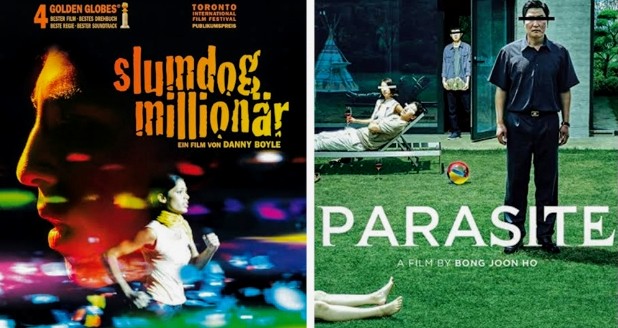Slumdog Millionaire and Parasite: A unique analysis of Similar-looking Miserable Tales
Despite the commercial success, the message of these Indian and South Korean movies is worth inspecting as it reflects two distinct cultures with their pros & cons.
By Vikas Pawar
Generally, Movies are associated with their society, speak the unfolded mystery, and best utilized for the entertainment of the audience. Movies have nothing to prove, except grabbing the attention of the audience while watching. One scene after another, one dialogue after another, a chain of roles, changing locations, and more than anything the hidden messages supposed to be delivered to the audience. In these fast-moving times, the movies have the potential to deliver a message to millions of people on one go.
Recently, two popular movies from India and South Korea, which succeed in attracting a high degree of popularity and attention, namely ‘Slumdog millionaire’ and ‘Parasite’ give us a new class of entertainment. Stories of these two super hit blockbusters crossed their national boundaries and reached a larger global audience. Although the movies have been widely accepted by the global audience with great love and appreciation, their success stories had been evaluated by the degree of their commercial success and the awards won on the national and international stage. However, the actual silver lining is lying in the realm of the storyline of the movies. In both the movies, the demonstration proposed is to highlight the social reality and its representation to the audience, which is highly grounded in poverty but the difference lies in the intention of solving the social problems.
The purpose of writing this piece is to draw a comparison between the storyline of these two movies and present a systematic analysis of their present order of existing reality, which is unlikely to match, what is left to the audience is simply a dream, however, dreams are commercial. In following movies, there is no doubt, it dictates the hard reality of two similar-looking measurable tales of poverty to a wealthy dream, one is with the instrument of a fluke, and the other is with the strategies of forgery, conspiracy, and struggles.
In short, the objective of the movie’s central character is to become rich while attempting to overcome social reality. Both movies resemblance one another yet the protagonists differ in approach to accomplish objectives. I presume all events in both movies consist of naming, storyline, and psychological philosophy behind the tales. The principle, upon which all three events will be analyzed, will be looking into the paradigm of exiting social reality and its representation in popular culture. First, I inquired with nomenclatures of both the movies; ‘Slumdog Millionaire’ and ‘Parasite’.
 As the name itself narrates the story of a slum person who dreams to be a millionaire whereas ‘Parasite’ means someone who grows on others without returning anything to the host. The name is a somewhat negative connotation, emphasize mostly the internal conflicts of these two countries’ socio-cultural reality. The representation of the social realm is the outcome of expectations with an existing understanding of societies. Both nomenclatures reflect the sentiments of invisible forgoing hard-core conflicts to which societies are struggling to come back. The naming reveals the representation of deep-seated social-economic manifestations of societies. The untold misery, struggle, and accomplishment of the dream of poor societies exhibit a struggle for sale.
As the name itself narrates the story of a slum person who dreams to be a millionaire whereas ‘Parasite’ means someone who grows on others without returning anything to the host. The name is a somewhat negative connotation, emphasize mostly the internal conflicts of these two countries’ socio-cultural reality. The representation of the social realm is the outcome of expectations with an existing understanding of societies. Both nomenclatures reflect the sentiments of invisible forgoing hard-core conflicts to which societies are struggling to come back. The naming reveals the representation of deep-seated social-economic manifestations of societies. The untold misery, struggle, and accomplishment of the dream of poor societies exhibit a struggle for sale.
Poor to Rich dream/ Low class to high class: After the close examination of the storyline of the two movies, for description, I have attempted to put forward the main four theme words, (Poverty/Wealthy and Low Class/ High Class).
Related article: EXCLUSIVE: OSCAR Front Runner Korean movie PARASITE to be released on 100 screens, 20 cities in India on Jan 31
Further, I joined and divided them into two parts; A) ‘Poverty to Wealthy’ Dream B) ‘Low class to High-Class Dream, with the urban society, being the common background in both the storylines. One way of looking at Slumdog Millionaire movie, which represents a ‘dream to a youngster who participates in a reality show and answers all the question while revisiting his past’ his past was filled with social problems like child trafficking, child labor, prostitution, etc. where the narrator has concealed social reality at the end and has projected the importance of luck in once life.
In this movie, the protagonist has always been shown weak and fearful behavior. On the other hand, the Parasite movie is a representation of the lower-class struggling to survive mostly with the urban rich class. A clear-cut storyline based on class distinction. Mainly, the interaction played between the three families, one, that of the rich man’s family, second of the old servant’s family, and third of the new servant’s family. Movies revolve around the trust and conflicts among these three families. Demonstration of basement life and the upstairs life added with the filth, greed, and forgery to eradicate poverty and their struggle. The comparisons of basement life are equated with the life of a cockroach. Nevertheless, as the names signify, Parasite, which tries to reflect a relationship of low class, which habitually exploit other and give nothing in return to high class instead demands the social security by providing their labour, whereas in Slumdog millionaire movie, as the name signifies, a person who is in slum becomes a millionaire.
Although slums and low class can’t be seen with the same glass. Indian Slum is comparatively in the worst condition, whereas the representation of the low-class basement society is in a better condition in South Korea. The stories of both the movies are an eye-opening reflection to a global audience, not just the stories but their existing inequalities as well. The stories could be interpreted as both low to high society perspective or slum to millionaire perspective. The similarity of both stories is in the unseen struggle of bread in the era of growing materialism.
Related article: Shah Rukh Khan watches South Korean film Parasite on the recommendation of his children; finds it ‘delightfully discomforting’
Philosophy of Karma/ Hierarchy: The growing urbanization, unemployment, and class struggle making a new man’s life are full of challenges rather than being a comfortable world. In parasite movie, Servant (Chauffeur & Cook) worked under a wealthy family, once the order has been given, has to be followed without any excuse regardless of the difficulty of work. In one scene, the couple told the maid to cook his son’s favorite dish at the plate in the night while returning from the camping, the maid accepted and immediately she started cooking the favorite dish of the couple’s child. Thus the old fifteenth-century philosophy of Confucius hierarchy is still apparent in Korean society. The servant has to obey the owner. And still influencing largely in all social interactions. Whereas in Slumdog millionaire movie, more than one relationship with others, the importance in the narrative was focused on ‘Karmic deed’, one looks for quiz answer in his past deeds. The past karma returns while answering the question. These two philosophies are pretty dominant in the popular culture and societies of these two countries, therefore, both the movies somehow represent the karmic & Hierarchal concept in their stories.
Conclusion:
Despite the commercial success, the message of these stories is worth inspecting as it reflects two distinct cultures with their pros & cons. Although the change in society influences the arrival of a new culture. However, the fundamental social interaction remains static. The dominance of India’s poor to rich /Karmic deed and Korea’s low class to high-class race/ hierarchy still dominant in popular culture. The family in ‘parasite’ is looking for social security while seeking a job for each member of the family. While deeply observing, I found that the family members in ‘parasite’ are mentally rich and strong, the family adopts the theory of survival of the fittest. They get an advantage by finding the loopholes of societies. Rather they have no fear of committing a crime. They eat the job of others. However, in ‘Slumdog millionaire’ the protagonist’s luck and fiction dominates the story.
About the author:
E-mail: vikas0388@gmail.com

Mr. Vikas Pawar is a senior research scholar and was affiliated to the Centre of East Asian Studies, Jawaharlal Nehru University, Currently writing his thesis on title ‘Revival of Korean Buddhism during Japanese Colonial Rule: Strategies of Cooperation and Resistance’. He holds a bachelor’s and Master’s Degree in Korean Language and Literature from Jawaharlal Nehru University, New Delhi. He has written his M.Phil. Dissertation on Tittle ‘Narrative as an Instrument in India Korea Relations: A Case Study of Ayodhya Princess Legend’ in (2016) at Centre of East Asian Studies, Jawaharlal Nehru University, New Delhi. His Area of academic and research interest are Korean, Culture and literature, comparative cultural studies, India-Korea Cultural Relations, Korean Buddhism during the Colonial Period.



